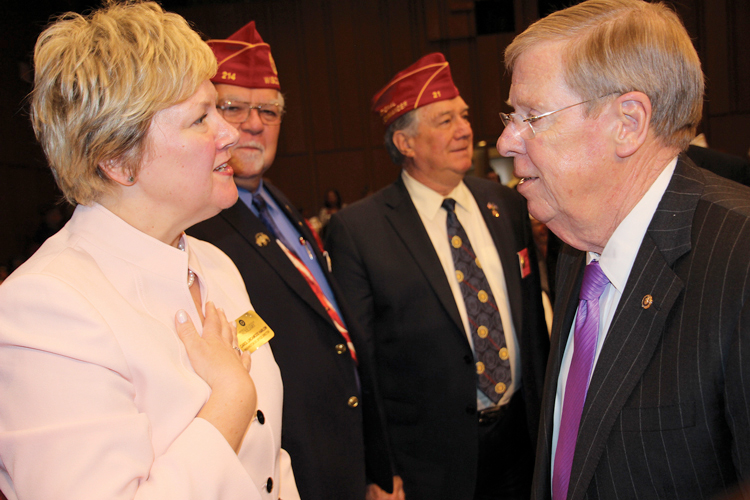
The American Legion Auxiliary (ALA) advocates on behalf of, veterans, military, and their families. Advocacy is defined as a constituent relaying his or her ideas and opinions to governmental officials, such as the President of the United States, US senators and representatives, governors, legislators, mayors, commissioners, and city council members.
The American Legion Auxiliary is a strong advocate for veterans and national security issues promoted and supported by The American Legion. Many bills pertaining to veterans benefits, military funding, and U.S. Department of Veterans Affairs funding are proposed every year. While the ALA might not speak out about every bill introduced, ALA members should take the opportunity to make a difference for legislation of particular interest to the Legion Family, veterans, and our military.
The ALA supports the public policy positions of The American Legion. The American Legion regularly adopts and renews legislative intent resolutions. The resolutions reflect the will of the membership and serve as instructions to Legion officers and staff as to which legislative issues to monitor and what positions to take.
The American Legion publishes and disseminates a range of public policy material to communicate its public policy positions, including legislative intent resolutions, legislative priority sheets, legislative point papers and congressional testimonies. These materials are available at the Legion’s Legislative Center at http://www.legion.org/legislative.
Legislative issues recurring for The American Legion Family include the following:
Veterans Program Funding
Veterans Healthcare
Veterans Disability
Veterans Education and Employment
Troops and Family Support
Americanism
Advocacy succeeds when many individuals with the same goals and sentiments contact government officials and staff members to express their views. By virtue of our numbers, the more than three million members of The American Legion Family are a mighty force in providing for today’s needs, and working toward a better future for our veterans. Because the ALA represents wives, mothers, daughters, granddaughters or sisters of a veteran, plus women veterans, we bring a unique perspective and voice to the public policy process. Advocacy is not the responsibility of a few. It is the responsibility of all who care about our veterans.
To learn about the legislative issues currently being endorsed and supported by The American Legion Family, or more about constitutional protection of the American flag, click here. https://www.alaforveterans.org/advocate/
In the spirit of Service, Not Self, the mission of the American Legion Auxiliary is to support The American Legion and to honor the sacrifice of those who serve by enhancing the lives of our veterans, military, and their families, both at home and abroad. For God and Country, we advocate for veterans, educate our citizens, mentor youth, and promote patriotism, good citizenship, peace and security.